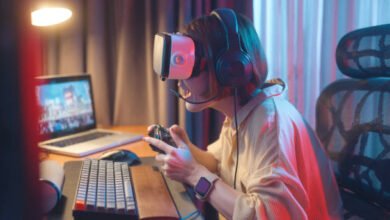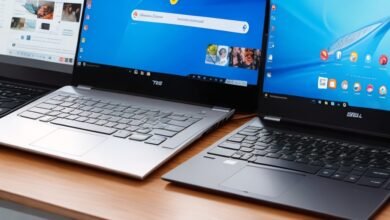What should I know before I buy a laptop? – Mysteries to Picking the Ideal Laptop

It doesn’t matter if you’re a dedicated Laptop gamer or require something to keep you entertained on long flights You need a computer that can meet your needs without consuming every dollar. The ideal laptop varies between different people however there are some specifications that you must be aware of.
Most importantly, you must decide what kind of work you’ll need your Laptop to complete. In the event that you’re looking for something to use at school or work You’ll require a lightweight device that has a long battery. Designers and gamers are also in need of devices with plenty of processing power as well as an adequate design card.
Once you have a clear idea of the features you’re looking for, now is the time to begin your search. It is essential to consider specifications and costs prior to settling on the right computer and be sure to read online reviews. With a little research you’ll be able to locate the perfect Laptop to suit your needs.
1. Set your financial goals
2. Write down the reason you’ll use it.
3. Choose between one of a Macintosh or choose a PC
4. Think about the size of your screen
5. The duration of the research battery
6. The processor is the one to decide.
7. Think about brands.
1. Make a decision on your financial plan
When it comes to workstations the one thing you must keep in mind is the budget you have set. When you consider all things considered, PCs could cost anywhere between two and three hundred dollars up to several thousand. Overall what are your thoughts on the budget you’re planning for an PC?
First look into your needs. What are you truly looking for an PC to do? Do you believe that you’re an understudy that needs something to help with school? On the other hand do you think you’re an experienced professional who requires some kind of work-related item? Based on your needs it is possible that you need a more expensive PC that has specific features.
If you are able to understand the reason you need a PC examine your finances. What is the maximum amount you could ever pay for an PC? Make a budget for yourself, taking into account your needs and budget.
Once you have your budget plan mapped out, start looking out the PCs that will meet the requirements of your budget. Examine the costs and elements to finding the perfect PC for your needs. By a bit of investigation you’ll be able to find the perfect PC, without burning through every penny.
2. Write down the reason you’ll use it.
Your computer is pretty just as good as the things you plan to use it with. If you’re looking for an efficient machine to cope with a variety of tasks, or a sleek and flexible device to travel There is a perfect computer available but only if you are aware of what you want to look for. Below are a few of tips to keep in mind when choosing your next computer.
Above all above all else, you must be clear about the reasons you’ll be using this feature. What are your main requirements? Are you looking for something light and comfortable for travel? Perhaps you’re searching for a powerful device that can handle the toughest tasks? On the other hand, do you really need something somewhere in between? Once you’ve identified your needs then you can start reducing the options.
Another aspect to think about is your budget. What is the amount you’ll spend on a new computer? Keep in mind that the final product will reflect the cost of its purchase in general higher priced PCs provide superior performance and features in comparison to their cheaper counterparts. There are many exceptional PCs that are available with a range of price points and you shouldn’t be hesitant for an instant to search through until you find the one that meets your spending budget.
Finally, you should try to do a thorough research before deciding on a specific PC. Study surveys, examine specifications, and examine feedback from clients to know about the advantages each device offers. If you can find the time to conduct all the research you need to do You can be confident that you’re purchasing the appropriate computer for your needs.
3. Select either you prefer a Macintosh or you can choose to use a Laptop
Concerning PCs There are two primary types: Macintosh and PC. Overall what do you think is the best way to get any idea of which is best the best for your needs? The following are some important aspect to consider when making your choices:
The Working Framework Macintoshes are a part of macOS, while computers are a part of Windows. If you’re familiar with any of these frameworks, it is a good idea to stick with what are familiar with. However, if you find you’re interested in having the chance to try a novel thing, either deserves consideration.
Processors: Macintoshes use Apple-planned processors while computers rely on processors from a range of manufacturers. In general, Macintoshes will generally have some sort of preferred processors than laptops. But, that’s not always the case, so it’s worth doing some research to find out which option is the best fit for your needs.
Weight and size: Macintoshes and laptops arrive with a range of sizes and weights. This way, based on your requirements the one you choose could be more suitable than the other. For example, in the event that you are planning to travel extensively with your computer then you must choose the lighter version.
Cost: Generally, Macintoshes will generally be more expensive than computers. But, as you can imagine there is a broad variety of prices for the two varieties of computers. This means that dependent on your budget plan, either one can be a viable option.
Some highlights Macintoshes as well as computers are accompanied by an array of components. So, before going on your decision it is advisable to make an investment in determining what elements significant to you. For example, on the off possibility that you’re looking for an apparatus for editing video it is essential to make sure that the computer you choose is powerful and has sufficient room.
Finally, the decision of deciding whether to go with at last, the decision of whether to choose a Macintosh or at last, the choice of whether to choose a PC is a matter of personal preference. Take into consideration your requirements and what is important to you, and decide on the one which is best for you.
4. Take into consideration the size of your screen
When choosing a computer the screen size is an important consideration. Smaller workstations are small, yet they could be less survey-friendly. However larger computers may be smaller, but will provide you with a more enjoyable review experience.Here are some points to keep in mind when settling on the perfect size screen for your needs:
The most important thing to take into consideration is how you’ll use your computer. If you plan to use your computer mostly to check email, browse the web as well as other minor tasks then a smaller screen could be sufficient. In the event that you plan to use your computer to perform more arduous tasks, such as gaming or video editing then you’ll require a larger screen.
Another thing to think about is practicality. If you plan to take your computer to wherever it goes, having a small screen may be more suitable. Workstations with larger screens can be difficult to move and might require a different case for transport.
At last, contemplate your spending plan. The larger screens will usually cost more than smaller ones. If you’re on a tight budget plan, a less expensive screen may be a sensible option.
Screen size is a crucial consideration when choosing a computer. The ideal size will be determined by the way you plan to use your computer and how flexible you would like to make it. Keep these things in mind when selecting your computer to ensure you select the best PC to meet your needs.
5. The duration of the research battery
If you’re searching for a replacement PC, a key factor to think about is battery’s duration. If you’re honest it is best not to be connected to a power outlet for the duration of your life. Here are five tips to help you determine the duration of your battery so that you can find the perfect computer for your needs.
It is essential to understand the way you’ll actually be using your computer. If you think that you will use it for browsing the internet or for word processing and for email, then it is likely that you will be able to use an operating system with shorter battery life. But, as it happens however, if you intend to use your computer to perform more serious tasks like gaming or video altering then you’ll require an operating system with an prolonged battery time.
You can then look into the specifications of the laptops or computers you’re thinking of. The duration of the battery will be noted in the specifications. But, keep in mind that the duration of your battery stated by the manufacturer is typically basing itself on ideal conditions. In actuality, you could imagine that your battery will be half more than what is advertised. So, if that a PC comes with a battery time that is 8 hours long, then you may imagine that it will continue to run for approximately 4 hours actually.
When you’re looking at the specifications, concentrate on the battery’s Watt-hour (Wh) ratings. A higher rating for Wh means it will last longer. For instance, a laptop equipped with a battery of 40Wh will last longer than a computer that has a battery of 30Wh.
Another thing to think about is the processor. A computer that has more powerful processor will generally be more limited in battery life. This means that should you’re looking for a computer with a lengthy battery time it is recommended to consider the processor that is less powerful.
In the end, you should look up surveys on the computers you’re thinking about. The online commentators often mention the duration of their battery in their polls. Additionally, they can provide more of a clear idea of what’s to come from the duration of the battery.
With these suggestions You should be able that you will find a computer with a battery life which is suitable for you.
6. The processor is the one to decide.
A computer’s processor is among the primary components to consider when choosing the best machine. Below are six suggestions regarding how you can choose the best processor to meet your needs.
1. Verify the speed of the clock. This is the primary determinant of the processor. It is basically a way of determining how fast the Laptop is able to think. The more high the number, the more efficient.
2. Take into consideration the number of centers. A processor that has multiple centers is able to handle a variety of tasks at the same time. If you’re doing various tasks or use requests for applications, a system that has additional centers is an ideal choice.
3. Analyze various brands. Different processors are not identical. Certain brands are superior to others. Take a look to figure the brands that are considered as the top in the market.
4. Take a look at your budget. The cost of processing equipment can be extremely volatile. Making sure that there is a good balance between performance and price is vital. It’s also worth looking into this as a more powerful processor is likely to increase the overall cost of the Laptop.
5. Learn about surveys. If you’ve trimmed your choices take some time to look through the surveys of processors you’re considering. This will give you an idea of their behavior in real life situations.
When you take all of these elements into account it is possible to quickly compare brands and select the best laptop for you.
In the case of laptops, there’s no “one size will fit every” solution. The ideal laptop for you is based on your requirements and preferences. Research and ask your friends for suggestions to locate the ideal laptop for you.



